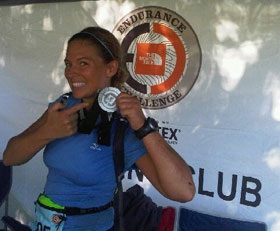 Because completing my first Olympic distance triathlon was not enough, I decided to follow up a week later with my first ultra marathon – a 50K (31 mile) trail race in The North Face Endurance Challenge series! If you’re surprised, trust me, I was too! I actually thought I was competing in a 20-miler! But, you know what, when it came down to it, I trusted myself and my nutrition fueling plan. I just committed to having fun.
Because completing my first Olympic distance triathlon was not enough, I decided to follow up a week later with my first ultra marathon – a 50K (31 mile) trail race in The North Face Endurance Challenge series! If you’re surprised, trust me, I was too! I actually thought I was competing in a 20-miler! But, you know what, when it came down to it, I trusted myself and my nutrition fueling plan. I just committed to having fun.
Here’s how I survived my ultra marathon:
- Carb-load – Carbs are gasoline for the body and you can’t attempt a 50K without putting gas in the tank. I had two cups of whole wheat pasta with marinara sauce and some salted steak fries the night before my run.
- Early riser breakfast – I woke at 4 a.m. for a 7 a.m. start and I noshed on a toasted plain bagel with almond butter, a banana, and water.
- Drink early and often – Always run with fluids. Water is OK if you are exercising in cool weather less than an hour, but after that I’d choose a sports beverage. I gulped on 3-4 ounces of the sports drink every 2 miles (20-22 minutes), even if I didn’t feel thirsty. The number one health risk in an ultra marathon is dehydration. You prevent it by drinking from start to finish of your races and training run.
- Eat on the run – I had my last meal at 6 a.m. and crossed the finish line at about 1:30 p.m. That’s a long time to go without any nutrition. This is one of the things that makes ultra distance trail running different than other races, you spend more time at your rest stops and you get bits of food that help you delay fatigue and stay energized. I usually go for what looks appetizing and I favor salty foods over sweet, mainly because my sports drink is so sweet that the salty foods are a happy change.
Not only that, but the longer you engage in outdoor activity and the more you sweat, the more salt you lose. It is common for a heavy sweater to lose 1,000-2,500 milligrams of sodium per hour, and up to 5,000 mg sodium in a hot environment. I had 1/2-1 cup of chicken soup or broth at miles 15, 19, 25, and 28 and I honestly think it boosted me the entire time. The salty broth made me want to keep drinking between stops. I also enjoyed a boiled potato dipped in rock salt at one point along the journey. Other items on my list included cola, pretzels, and frozen oranges. Between rest stops, I chewed on cola flavored Powerbar gummies with 50 milligrams of caffeine (which actually gives a bit of an athletic performance boost).
Non-runners might be reading this and thinking “How can this stuff be good for you? Isn’t it what you are supposed to avoid?” That’s a mistake you don’t want to make if you venture into distance running. It can be very challenging and rewarding, but people who ignore the basics of hydrating and fueling to delay fatigue are the ones who end up with cramping, heat illnesses or the dreaded DNF (did not finish).
I finished the race in 6 hours 29 minutes and placed sixth out of 30 in my age group, and while I was completely happy with those stats, I think I was most impressed with my attitude and energy at every mile. Eight years ago, I worked in information technology, weighed 165 pounds, and even though I was a former aerobics instructor and personal trainer, I was barely active and my nutrition was in the toilet. I never would have guessed that I would one day finish an ultra marathon – something less than 10% of runners (that’s people who already like to run) ever attempt. If I can do it, you can too. Start somewhere. Take one mile at a time. Believe in yourself, even if nobody else does.
